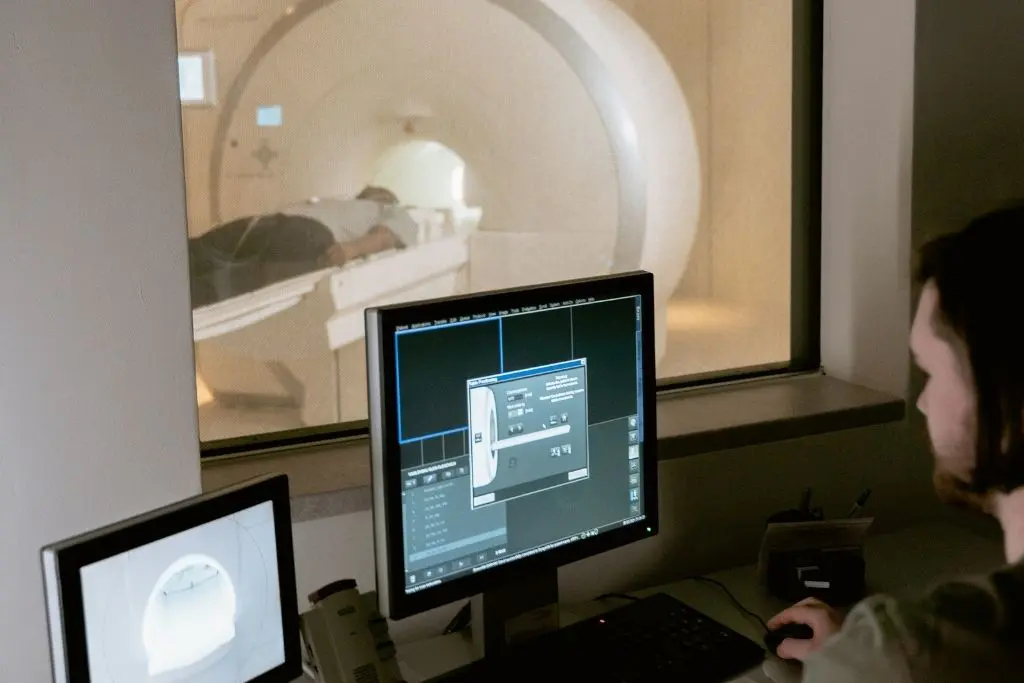A ground-breaking new brain scanner, integrated with artificial intelligence, is being trialled in Kent. It could revolutionise the way we diagnose dementia. The innovative low-field MRI technology, the first of its kind to be owned by an NHS Trust, promises to dramatically cut waiting times and deliver more accurate results. This could give patients a much faster route to vital support and treatment.

In collaboration with the Kent and Medway NHS and Social Care Partnership Trust (KMPT) and Canterbury Christ Church University, the novel research will deal with one of the largest dilemmas in dementia care: the protracted and complex process of receiving a diagnosis.
Its mission is to improve the availability and effectiveness of brain scanning. It’s seeking to take patient assessment away from specialist hospitals and into local communities. With the new approach, there may be a more balanced, more inclusive healthcare system for residents across the region and, ultimately, the country.
The Lengthy Road to a Diagnosis
The current pathway for a dementia diagnosis can be protracted and stressful for patients and their families. It typically involves an initial GP visit, followed by a series of memory tests, blood checks, and often, a referral for a structural brain scan. These scans might be a CT or a traditional MRI.
Why Traditional Scans Fall Short
These scans are useful for ruling out other conditions like strokes or tumours. However, they are often just the first step in a long process. More definitive tests, such as PET scans, are less accessible. They are often reserved for cases where there is diagnostic uncertainty. The high cost, invasive nature, and limited availability of these advanced tests mean many patients never receive a definitive subtype diagnosis. This diagnosis is critical for future treatments.
The lengthy and fragmented system adds stress to an already difficult time for families. Waiting months for a diagnosis means delays in accessing support, making plans, and beginning a journey with more clarity.
How the New Technology Accelerates Assessments
The new low-field MRI scanner is smaller, more affordable, and more portable than its traditional counterparts. Its integration with AI is key. The software enhances image quality, making it possible to produce detailed scans comparable to those from a conventional, and much larger, machine. The research in Kent will specifically investigate whether the scanner can shorten the time it takes to get a diagnosis, a critical factor for patients.
Bringing Care Closer to the Community
Dr Joanne Rodda is a Senior Lecturer at the Kent and Medway Medical School (KMMS) and a Consultant Psychiatrist at KMPT. She highlighted the significance of the trial. “Our work will begin by testing whether the scanner can make it easier and quicker to diagnose dementia, which is currently one of the biggest challenges we face in healthcare,” she said.
“It could be a huge step forward in speeding up dementia assessments, giving patients their results more quickly wherever they live, and making the whole process fairer and more joined up.”
The scanner’s portability means it can be installed in a wider range of healthcare settings. This includes community clinics and research facilities. It reduces the need for patients to travel to large hospitals. This decentralised approach could be a game-changer for people in rural or less affluent areas who may face barriers to accessing specialist care.
Dr Afifa Qazi, Chief Medical Officer at KMPT, expressed her excitement about the project’s potential. “We are introducing the first low-field MRI scanner owned by an NHS trust in England. This innovative technology has the potential to enhance diagnostic accuracy and improve treatment options for our patients,” she stated.
Beyond UK Borders: The Global Race for a Cure
The project in Kent is part of a wider global effort to use technology to tackle the growing dementia crisis. Researchers at the Mayo Clinic in the US have developed an AI tool called StateViewer. It analyses a single PET scan to identify patterns linked to nine different types of dementia. The tool has been shown to identify the correct type of dementia in 88% of cases. It also helps clinicians interpret scans almost twice as fast as standard methods.
Predicting Dementia with AI
In another international study, researchers at Duke, Harvard, and the University of Otago created a tool named DunedinPACNI. This tool uses a single MRI scan to estimate a person’s “biological ageing rate.” In trials, it was able to predict who would develop dementia years before symptoms appeared. Those labelled as “fast agers” were 60 per cent more likely to develop the condition later in life.
The UK’s Urgent Need for Change
The UK Dementia Research Institute (UK DRI) has consistently called for an acceleration of diagnostic capabilities. In a recent manifesto, the institute highlighted the urgent need for “new, accurate and scalable diagnostic tools” to prepare the NHS for the delivery of new treatments.
The manifesto noted that as of late 2023, more than half of local authorities in England were failing to meet the national target of diagnosing 66.7% of people with dementia. The document also pointed out that only 2% of people diagnosed receive specialist tests to confirm the underlying cause. This is a major roadblock to new, targeted drug therapies.
A Clearer Path to Treatment and Support
An accurate and timely diagnosis is the critical first step to accessing the care and support a person with dementia needs. It also provides the gateway to new and emerging treatments. Many of these are most effective when administered in the earliest stages of the disease. Without a clear diagnosis of the underlying cause, such as Alzheimer’s or vascular dementia, patients may be ineligible for specific therapies.
The UK DRI manifesto underlined this point, stating: “Early and accurate diagnosis is the gateway to essential support, care and treatments. Emerging treatments will only be effective if we can detect dementia at the earliest possible stage of disease, and precisely identify the underlying disease, such as Alzheimer’s.”
The Human Impact of Diagnosis
In Kent, a newly installed brain scanner is being described as a notable advance in dementia diagnosis. Similar innovations are emerging internationally, but this one is designed to work alongside existing services in the region. Using AI, it can detect extremely small changes in the brain – the kind that are invisible to the human eye – and could provide a level of diagnostic accuracy that has been difficult to achieve in everyday clinical practice.
For years, the Alzheimer’s Society has argued for improvements in how diagnoses are made. Its reports draw on accounts from people living with dementia, showing the significant emotional and practical effects of the condition. Many describe a loss of personal identity and major changes to daily life. A diagnostic process that is both faster and more certain could help reduce delays, giving people earlier access to guidance and support.
The Next Steps for This Revolutionary Technology
The second hurdle is proving the low-field MRI scanner, assisted by AI, can deliver the level of diagnostic quality necessary for implementation across the NHS.
If the tests are successful, there could be a significant turning point in dementia treatment. Diagnosis – so often slow and speculative – may become faster and more definite. That in turn would enable clinicians to plan more tailored therapy and provide the family with a clearer sense of the future.
At this point, the research team is busy in the process of garnering evidence from ongoing tests and assessing the efficacy of the technology. It aims to create a quicker, more convenient, and more precise diagnostic path. This may benefit thousands of individuals in the UK who are already suffering from dementia or who are very likely to acquire the disease.



